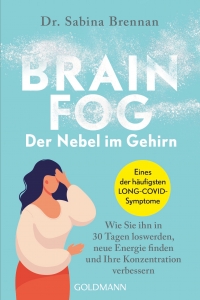Kulturtipp in DNEWS24
Brain Fog: der Nebel im Gehirn – Buchtipp und DTalk mit der Autorin Sabina Brennan
Millionen Menschen leiden an Brain Fog – Long Covid. Wie erkennt man Long Covid, was kann man gegen Brain Fog tun? Dazu gibt ein neues Buch von Dr. Sabina Brennan Auskunft.
Antriebslosigkeit, Konzentrationsschwierigkeiten und das unangenehme Gefühl, nicht mehr klar denken zu können: Viele, auch junge und körperlich gesunde Menschen leiden unter Brain Fog, werden aber aufgrund der unklaren Symptomatik von ihrem Arzt oft nicht ernst genommen. Dabei wird uns Gehirnnebel als eines der häufigsten Long-Covid-Symptome auch als Gesellschaft zunehmend beschäftigen. Die renommierte Neurowissenschaftlerin Sabina Brennan hat mit diesem Buch den ersten umfassenden Ratgeber zu diesem noch wenig erforschten Krankheitsbild verfasst. Sie beschreibt leicht zugänglich, wie unser Gehirn funktioniert, woher der nebulöse Zustand kommt und wie wir über einfach umzusetzende Strategien in kurzer Zeit wieder zu mehr Klarheit, Energie und Lebensfreude finden.
DTalk mit Dr. Sabina Brennan
DNEWS24: What are typical symptoms of Long-Covid?
Dr. Sabina Brennan: The symptoms of Long-Covid, also referred to as post-acute sequelae SARS-CoV-2 infection (PASC) are many and varied.
The most common symptoms are: Fatigue, shortness of breath, loss of smell and muscle aches (myalgia).
Brain fog is a long covid symptom that has been described as debilitating and the sequelae most likely to prevent people from returning to work. Other symptoms of Long-Covid include:
- difficulty sleeping
- anxiety, depression or an inability to feel pleasure and enjoy things
- heart palpitations
- chest tightness or pain
- change to your sense of taste
- persistent cough
- changes in skin and hair, including hair loss
- nausea and vomiting
- high temperature
- bowel incontinence
- erectile dysfunction
- limb swelling
- amnesia
- hallucinations
- difficulty with motor function or speech
DNEWS24: How do you recognize these symptoms?
Dr. Sabina Brennan: Brain fog is a general term that describes a variety of symptoms. The most common symptoms are:
- Attention – sustaining, focus, concentrate, inability to tune out
- Memory – forgetfulness – forgetting what you did – working memory
- Learning – how to do new things
- Processing speed – takes longer to understand, process & formulate a response
- Language – word finding – not as fluid or as rich as ordinarily would be
- Exec functions – making decisions, assessing risk, planning, organising, inhibiting, irritable
- Spatial navigation – clumsiness
- Loss of mental clarity – fogginess
- Mental fatigue – distinct from physical fatigue
If you have ever had brain fog the following will be familiar:
“I just can’t think straight.”
“I’m too tired to think.”
“I can’t concentrate.”
“I struggle to recall what I did yesterday.”
“I keep having to reread the same sentence.”
“I can’t work because I can’t ‘tune out’ other people’s conversations.”
“My thinking is sluggish.”
“My life is like a game of Charades, I can’t find the right word, or I say the wrong word.”
“My language isn’t as fluid or as rich as it ordinarily would be.”
“I’ve lost my sense of humor.”
“I’m struggling with small decisions like what to wear or what to have for dinner.”
“I keep bumping into things, spilling things, or slamming doors.”
Most people will have experienced some, if not all, of these symptoms at some point in their lives. In fact, it is common to have these issues when you are sick with flu or other illness, if you have jetlag, or have been awake too long, have disrupted sleep, work long hours or are in a stressful situation.
Brain fog is different to these short-term disruptions
Persistent occur regularly and interfere with the quality of your life, your relationships and your work.
Brain fog is signal, a sign that something is amiss – a bit like a cough.
Brain fog is not a disease, disorder or diagnosis rather it is a sign or a symptom of an
- auto-immune conditions (e.g., lupus, Sjogren’s), inflammatory diseases, neurological conditions (e.g., migraine, multiple sclerosis) chronic pain (e.g., fibromyalgia), other chronic conditions, depression, anxiety, type 2 diabetes, and some cancers – viral infection – common after sepsis
- Side-effect of medication: chemotherapy, medications for auto-immune diseases, and depression, antihistamines, anti-nausea tablets, pain medications
- Hormonal imbalance or fluctuations: PMS, pregnancy, menopause, thyroid dysfunction, etc.
- Nutritional or dietary deficiency: vitamin B-12, iron, folate or Omega-3 deficiency
- Lifestyle factors: poor sleep, poorly-managed chronic stress, lack of exercise, lack of mental stimulatio
DNEWS24: What is the difference between brain fog and burnout?
Dr. Sabina Brennan: Brain fog has many causes and is usually the consequence of multiple contributing factors as described above.
In contrast burnout refers to emotional, physical or mental exhaustion alongside lowered motivation, decreased performance and negative attitudes. It is the consequence of performing at a high level until stress takes its toll. The performance can be from prolonged physical or mental exertion or a sense of being overburdened. Burnout tends to be experienced by highly-stressed, service-oriented professionals (teachers, social workers, prison officers), those exposed to secondary trauma (e.g. therapists, counsellors and experienced athletes repeatedly exposed to stress without reward or rest.
DNEWS24: Is there already enough medical knowledge to detect and treat Long-Covid and brain fog?
Dr. Sabina Brennan: The relationship between COVID-19 and brain fog is not yet fully understood, but it is likely a complex interplay between inflammation, immune and metabolic changes, depression, oxidative stress and PTSD.
It is possible that an immune response that was protective in the acute phase of the infection has become overreactive, triggering ongoing inflammation.
Many researchers have suggested that inflammation in the brain caused by this heightened immune response interferes with neural networks, possibly leading to cell damage, death or dysregulation making it harder for cells to communicate with each other.
Researchers in Oxford who compared existing medical records with post-covid scans have identified some tissue damage in certain brain areas including the hippocampus which plays a critical role in learning and memory but they have no way of knowing whether these particular patients experience brain fog.
Since Covid is known to adversely affect the circulatory system It is also possible that blood vessel changes make it more difficult for the brain to pick up the nutrients it needs to function well.
Either individually or in combination it’s possible for cognition to be affected by direct injury from the virus itself; low oxygen levels; high temperature; blood clots; hyperinflammation; inflammatory or immune disorders occurring in parallel with, or post-Covid-19 and sepsis.
It is likely that many other non-COVID factors known to contribute to brain fog also play a role. Many of these factors that contribute to or exacerbate symptoms are modifiable. Identifying, changing, or treating these factors could dramatically minimize brain fog symptoms.
Brain fog is not unique to Long-Covid and so while we are waiting to advance our knowledge oft he specifics of brain fog as a consequence of Long-Covid we can take advantage oft he knowledge that exists already in terms of treating brain fog through lifestyle choices and adjustments.
DNEWS24: What can you do yourself to become more efficient again?
Dr. Sabina Brennan: Prioritise Sleep. Keep to a regular routine. Go to bed and get up at the same time each day. Manage exposure to light. Open curtains on waking, spend at least an hour a day out in natural daylight, dim lights from 8 p.m., turn off devices emitting blue light an hour before bed. Brush teeth an hour before bed to avoid bright light just before sleep. Sleep in a darkened room. Charge devices in another room and turn notifications off. To enter sleep core body temperature needs to drop by 1 degree Celsius —think cool rather than warm bedroom. A hot bath before bed can help lower core body temperature.
Manage Stress: mile more, laugh more, have fun. Set aside time each day to do a beloved activity. Being fully present in the moment doing something that fully engages attention, can distract from pain, other ongoing symptoms or worries. Create a go-to laughter stash (videos, memes, podcasts, etc.) for managing stress. Open said stash before stress takes hold and have a laugh. Laughter is nature’s natural stress buster, it lowers cortisol levels.
Exercise: Exercise both body and brain. When recovering from COVID it is important to take things slowly and avoid the boom-and-bust cycle. Taking baby steps to gradually rebuild condition both physically and mentally is key.
Diet: ood is the fuel the brain needs to function properly. Nourish it. Rubbish in rubbish out. Everyone, not just those affected by brain fog, need to shop for their brains. Think of an overall diet rather than individual ingredients. A Mediterranean diet is best for brain health. Following a Mediterranean diet should negate the need to purchase supplements—there is currently no evidence to support their effectiveness for memory function or to stave off brain fog or dementia. If a medical doctor diagnoses a B-12 deficiency, folate deficiency or iron deficiency, they will prescribe accordingly.
General Survival Strategies: Focus on what a person can do, not what they can’t. Have a stash of easy “no brain” stuff to do for when brain fog strikes. This allows a person to feel productive even on bad days.
Step back and breathe. Feeling overwhelmed can elicit the stress response, which may further impair cognitive abilities. The brain will benefit from the extra oxygen. Once calm again break the task down into small achievable steps.
Seek support. With a broken ankle or arm there would be no issue asking people for help with certain tasks. Why should it be any different with brain fog? The brain is just another part of the body. Reach out and ask for support from family, friends and colleagues.
Die Autorin
Dr. Sabina Brennan ist Neurowissenschaftlerin und Psychologin. Derzeit hat sie eine Assistenzprofessur am Institut für Neurowissenschaften am renommierten Trinity College in Dublin inne. Sie untersucht schwerpunktmäßig die Risiken für Demenzerkrankungen und weiß, wie wir unser Gehirn im Alter fit halten können.
Bibliografie
- Autorin: Sabina Brennan
- Verlag: Goldmann
- Seiten: 480
- ISBN: 978-3-442-17953-4
- Preis: 14,00 Euro














